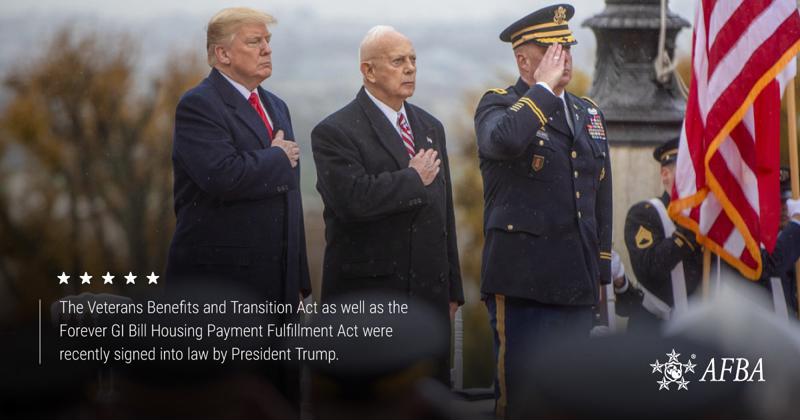Late last year, just days before breaking for the holidays, the 115th United States Congress managed to pass two pieces of legislation aimed at improving education benefits for members of the military transitioning into civilian life.
The Forever GI Bill Housing Payment Fulfillment Act, which was designed to correct mistakes made by the Department of Veterans Affairs that led to delayed and inaccurate payments for thousands of Post-9/11 GI Bill users, passed both houses with unanimous consent. Further bipartisan support was shown for the Veterans Benefits and Transition Act, which had a similar goal of protecting student veterans, as well as easing voting rules for military spouses and expanding burial benefits for military families, among other provisions.
President Donald Trump has since signed both bills into law. Here's what the new legislation will mean for military members and veterans moving forward.

GI Bill students underpaid due to VA errors to receive reimbursement
The first bill pertains to those taking college classes or getting on-the-job training through the Post-9/11 GI Bill, which provides up to 36 months of education benefits to qualifying veterans or active duty military members with at least 90 days of aggregate active duty service after Sept. 10, 2001.
Veterans were previously required to use these education benefits within 15 years of completing their service, yet that deadline was erased with the creation of the Forever GI Bill. Unfortunately, a Forever GI Bill provision that changed the way housing stipends are calculated was not implemented on time due to major technology failures at the Department of Veterans Affairs, which led to many students being underpaid, according to Military Times.
Not only did some students struggle to pay their rent or mortgage bills as a result, but many were also hit by late fees for tuition that the VA also failed to pay on time.
The Forever GI Bill Housing Payment Fulfillment Act of 2018 holds the VA accountable for retroactively fixing inaccurate payments and reimbursing affected students, while also barring schools from the practice of charging GI Bill students for tuition payments that are delayed through no fault of their own.
"For many student veterans, every dime counts," said Sen. Brian Schatz, D-Hawaii, who co-sponsored the bill. "That's why the VA needs to get this right and pay student veterans the full amount of money they were promised. I'm glad that my colleagues in the Senate saw how important this issue is, and I hope this bill stays on the fast track to becoming law, so we can make this right for our veterans."
More benefits for student, transitioning and homeless veterans
These student veterans protections are complemented by a provision in the new Veterans Benefits and Transition Act of 2018, which requires the Department of Veterans Affairs to provide GI Bill users with electronic proof that they will be receiving housing payments from the VA.
The new requirement will enable students to prove to landlords their ability to pay for housing even if they are a full-time student without active employment. The new law also enables the spouse of a service member who dies on active duty to terminate a residential lease without penalty for up to one year after the death.
In addition to students, transitioning service members and homeless veterans are also set to receive greater assistance acclimating to life on the homefront, thanks to the new law.
The VA is now required to contract with a non-federal entity to identify and post a list of programs and organizations that can help service members transition out of the military.
Another provision gives homeless veterans up to 60 days after moving into housing to apply for employment assistance under the federal Homeless Veterans' Reintegration Program. Previously, only veterans living on the streets or in a shelter were eligible for assistance.
The spouses and family members of U.S. military members are also impacted by the new legislation, according to Air Force Times.
Military spouses are now allowed to use the same residence as their active-duty spouse for state and local voting purposes, whether or not they meet the residency requirements of a state on their own merits.
The law also extends veteran burial rights to the spouses and children of active-duty service members, even if they pass away before the military member. Previously, being buried in veteran cemeteries required approval from the VA.


